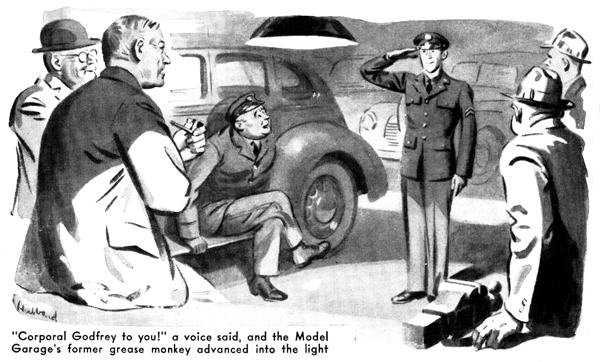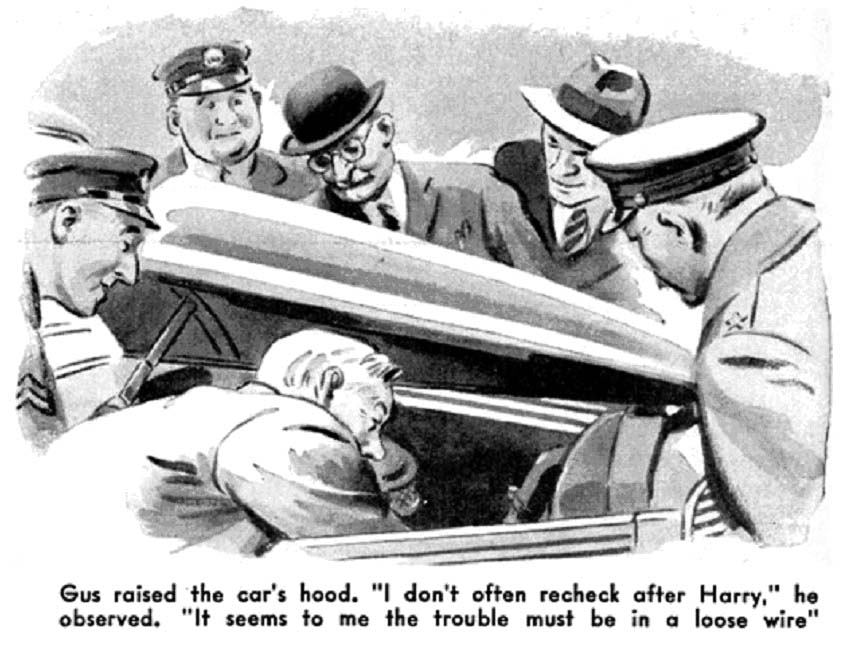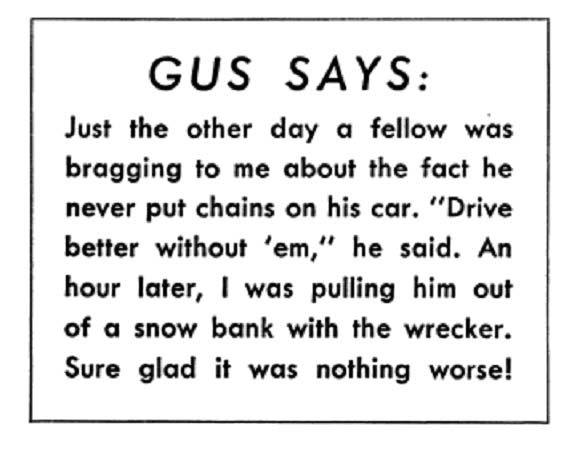March 1941
GUS SOLVES AN ARMY JOB
by Martin Bunn
The Brains of the Model Garage rarely had to help on a job his grease monkey tackled.
But Harry still
knows
where to turn for help on the general's car!

Several of us regular customers of the Model Garage have a habit of dropping in on Gus Wilson a couple of afternoons a week, after we've finished work, and sitting around his shop talking about this, that, and the other thing until it's time to go home to our dinners. Gus always seems glad to see us, but he goes right on with the job he's working on, and as often as not his contributions to the conversation come from underneath a car.
One afternoon, a half dozen of us happened to blow in, and by half past five the shop was full of tobacco smoke and conversation. We were talking about whether it is cheaper to turn in your bus for a new one every year, or to hang on to it until there's maybe seventy or eighty thousand on its clock.
Gus had been washing up. Now he pulled on his coat, filled his pipe and fired up, and came over and perched on the edge of his workbench. "What's the use of wasting your breath arguing about whether you should turn in your '41 model for a '42 model?" he wanted to know. "There mayn't be any '42 models. Likely as not the tool-makers will be too busy tooling up airplane and tank and gun factories to have any time for retooling the automobile plants. But, anyhow, no matter how long you keep a car, it's dead certain that you can save yourself both trouble and dough by taking decent care of it."
He reached into his inside coat pocket and pulled out a sheet of paper. "Here are some figures that'll help to show you what I mean," he went on. "I copied them out of an American Automobile Association report because I'm on the spot for a talk at the Kiwanis Club luncheon next week, and I've found that whenever you've got to stand up on your hind legs and expose your ignorance the best thing you can do is put down a nice thick smoke screen of figures between you and your audience . . . Well, anyhow, here's the dope. The Three A's figure that in a year out-of-luck motorists put in over four million emergency road-service calls because of battery trouble -- which with a little care and common sense usually is easily preventable. They also figure that there are over three and three quarter million calls caused by ignition failure -- over a million by starter trouble -- over a half million by brake trouble. All that grief isn't the result of carelessness , of course. But if you think that a whole lot of it isn't, listen to this one -- over a million and a quarter calls were the result of drivers running out of gas!"
Gus looked around triumphantly. Pretty soon George Knowles said: "Well -- so what? What are you driving at?"
"What I'm driving at," Gus told him, "is the fact that car owners, whether their cars are old or new, could escape a lot of inconvenience and unnecessary expense if they'd learn to take better care of their busses than most of them do. If they just use their heads they'll spend a little money on preventive service -- or check-ups and adjustments and the replacement of badly worn parts -- that would keep their cars from breaking down. Before many months a lot of them may even have to roll up their sleeves and do some work themselves. There's going to be such a demand for mechanics that auto repair shops and service stations are going to have trouble handling their work -- same as we have had since Harry Godfrey got called out with his National Guard regiment and we had to take in a green kid to replace a fellow who'd worked enough to develop into a real good mechanic."
"How's he doin' in the army?" Ez Zacharias asked. "Say, that kid Harry. . ."
"Corporal Godfrey to you!" a voice behind us said and the Model Garage's former grease monkey walked into the circle of light from the drop lamp wearing a wide grin and an army uniform with brand-new corporal's chevrons on it.
We all shook hands with him and wanted to know how he liked working for Uncle Sam.
"Swell!" he told us. "much better than sweating my heart out for this old slave driver Gus Wilson!"
Gus grinned "When did you get those stripes?" he demanded. "That's fast work!"
"They gave 'em to me yesterday," Harry said, "and they're apt to take 'em back tomorrow. I'm in dutch, Gus. They promoted me when they gave me the job of driving a Regular Army general -- and now I can't keep his car running. Is my face red!"
"Aw, don't let a general get your goat!" Zacharias snorted. "I know 'em -- when I was in the Army they was a dozen for a dime. They're always hootin' and hollerin' -- but what of it? Nothin' of it! Ever since I turned in my uniform I've been waitin' for a chance to tell one of them brass hats where to head in!"
"Don't pay any attention to Ez -- he's just a sorehead," Gus said. "What's the matter with your general's car, Harry?"
"That's the matter -- I don't know what's the matter with it," Harry told him. "This morning she wouldn't start. I checked her over. The gas feed, battery connections, switch, coil, and condenser all were O.K., but I couldn't get a spark at the plugs. Then, after I'd fooled around with the points and worked the automatic advance on the distributor a few times, I got a good spark -- but I don't know why. Next time I stepped on the starter the engine took off swell. I gave her a road test, and everything seemed O.K. So instead of reporting to the motor sergeant that the car was out of kilter, I started off with the general on one of his inspection trips. We hadn't gone five miles before the engine started acting up again. It would miss and go dead, but when I'd get it started it would run pretty good for a while. It's been doing that all day. Half a dozen army service men have tried to fix it, but they can't locate the trouble."
"Where's the car?" Gus asked eagerly, scenting an interesting job.
"Out by the gas pump;" Harry said.
Harry drove the car into the shop -- a two-year-old sedan painted gray-green like all the army's cars, and with a tag with two stars on it on its front fender. Harry hopped out and hurried around and opened the door -- and darned if his general didn't get out! We were all so surprised that no one said anything. Somehow we'd never thought of the general being in the car. He was wearing boots that you could see yourself in, and one of those uniforms that fit so that when you look at them your clothes feel too big for you. He had a stubby gray mustache and shaggy gray eyebrows, and you can take it from that he looked plenty hard-boiled.
We stood there staring at him, and then Zacharias began making funny noises, so we stared at him instead. He'd spit out his chaw of tobacco and pushed his postman's cap from the back of his head over his eyes, and he was standing with his little fingers down the seams of his pants legs and his chest stuck out so far that the top buttons of his vest were pretty near popping off. He gurgled for a while longer, and then he got out: "Private Zacharias, sir. Will -- will the general have a chair?"
One side of the general's mustache sort of twisted up, and then he grinned. "Handle's my name," he said. "Glad to meet you, Mr. Zacharias." He held out his hand, and Ez grabbed it and then dropped it as quick as if it had been a hot spark plug.
"This is Mr. Wilson, sir," Harry spoke up, "he's the best trouble shooter this side of -- I mean, sir, he's . . ."
"I know what you mean," the general said. He looked at Gus, and for a second his eyes rested on the silver veteran's button in his coat which shows that he was wounded in World War No. 1. Gus always wears it, although we've never been able to get a word about his war experiences out of him. General Handley grinned again and shook hands with Gus and said: "Mr. Wilson, I see that we've both fought and bled and been scared darn near to death for our country!"
Gus laughed and said that getting hit had been his own fault because he'd forgotten to duck. "I'm sorry you've been held up by this car trouble," he added. "I'll try to locate it and get it fixed in a hurry. In the meantime -- "
The general broke in on him. "In the meantime," he said with good humor. "I'll try to learn something useful while I watch you trying to make good on the big build-up that Corporal Godfrey has been giving you."
Gus raised the car's hood. "I don't often recheck after Harry," he observed, "but it seems to me the trouble must be a loose wire. Let's see, now," He tested the battery connections, the condenser, the points, and even the terminals of the flexible wire in the distributor. "No, Harry was right," he said. "The wiring checks O.K." Then he got in the car and stepped on the starter. The engine started smoothly.
"She's done that with me about twenty times," Harry said. "The trouble is that she won't keep on running like that. You'd better give her a little road test, Gus."
Gus nodded, and backed the car out of the shop. It ran without a sputter. Just as he cleared the shop door a car which had been standing at the gas pump came around the driveway, and he had to stop and let his engine idle until it had passed. Then he stepped on the gas -- and the engine began to miss. After a few seconds it cut out entirely. He started it again, and as soon as he speeded it up it cut out again. Finally it quit altogether, and we all -- including the general -- pushed the car back into the shop.
Gus got out looking puzzled. "Looks to me as though she wasn't getting gas," some one suggested.
"No, it isn't that," Gus said. "When an engine quits like that it isn't a sign of lack of gas."
He checked over everything again. Again all the wires seemed good. It must be in the distributor, he decided. "And there's only one certain way to check a distributor -- get it off the car and on the workbench where you can really get at it."
We all sat around and watched as he and Harry took off the distributor, took it over to the bench, tested its points, and removed the flexible-wire "pigtail" connecting the plate to the distributor terminals. Again everything checked.
Gus looked really stumped -- something that we haven't seen him do very often. He scratched his left ear with his right hand as he stared at the distributor. That must have given him an idea, for he grinned and muttered: "I'll bet that's it!"
He inserted a test prod in each terminal eye of the flexible wire. The test lamp went out. He released the tension on the wire. The lamp flashed on again.
"Found it!" he said triumphantly.
"Yes," general Handle said, "You've located the trouble -- but what the devil is the trouble?"
"The wire's broken inside its insulation," Gus told him. "Whenever the engine speed changes, the automatic spark causes the plate in the distributor to shift its position. That frequent motion has resulted in the wire breaking. When the ends of the broken wire happen to touch, the engine runs all right, but when they move apart, the engine misses and stops."
He handed the wire to the general. "If you'll pull on it, and then relax the tension, you'll feel the broken ends rubbing against each other, he said."
General Handley nodded. "I call that pretty smart troubleshooting," he said, "You've lived right up to your reputation, Mr. Wilson."
Gus looked sort of pleased, but he shook his head. "I should have spotted it quicker," he said. "I've never run into that exact trouble before, but we've had several cases pretty much like it."
It didn't take Harry and him long to install a new flexible wire and get the distributor back in place. When the job was finished the general thanked Gus and told him he'd like to have him as his motor transport officer, and then shook hands all around. By that time we all were feeling easy and natural with him -- that is, all of us except Ez Zacharias, who kept on standing up stiff as a ramrod, and who, when the general got into his car, gave him a snappy salute that made everyone feel foolish. Then Harry said "So long," and drove out.
George Knowles was the first to say anything. "If all generals are like that one," he told us. "I wouldn't mind being in the Army myself . . . Say, Ez, how come you didn't tell him where to head in? You said you'd been waiting twenty years for the chance!"
We looked around for Ez, but he wasn't there, and a few seconds later we heard the honk of his horn as he headed out of the driveway.
Gus laughed, "It'll be a long time before Private Zacharias hears the end of that."
END
L. Osbone 2019

